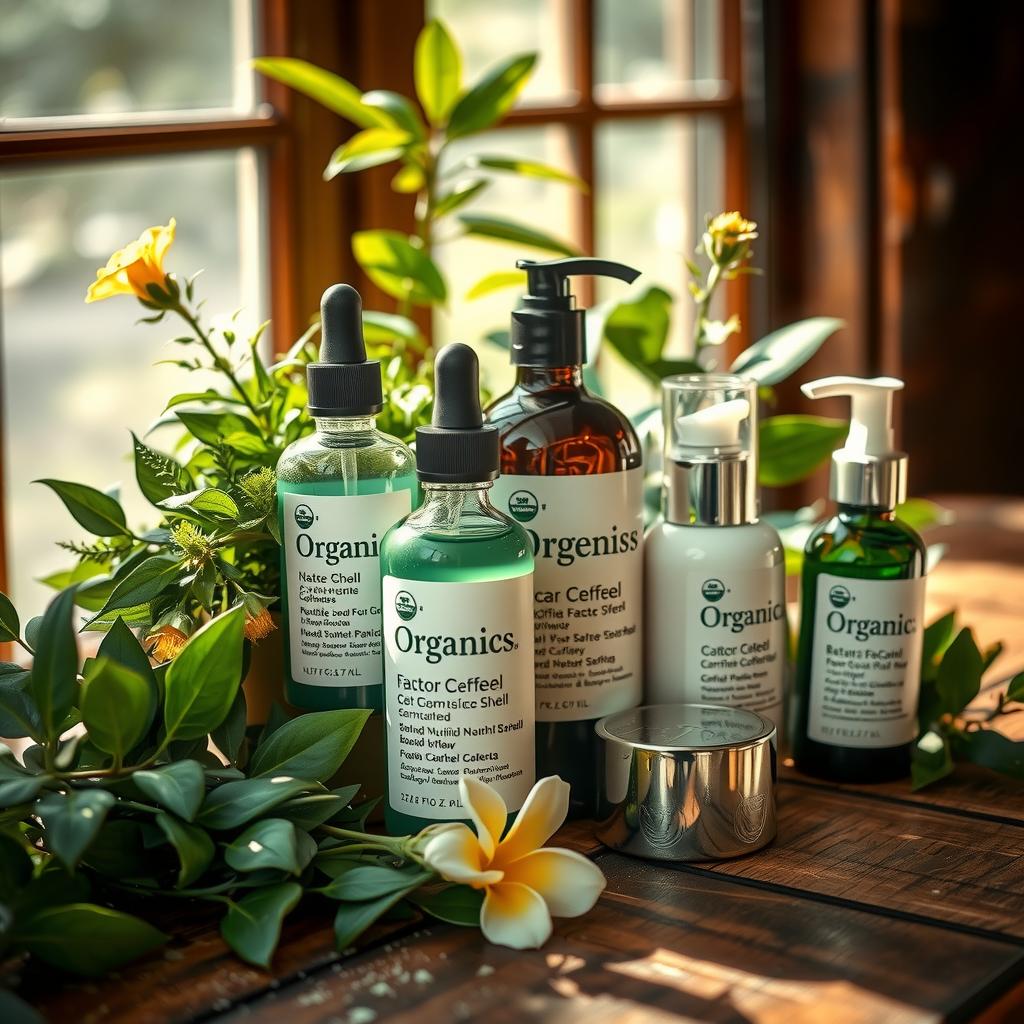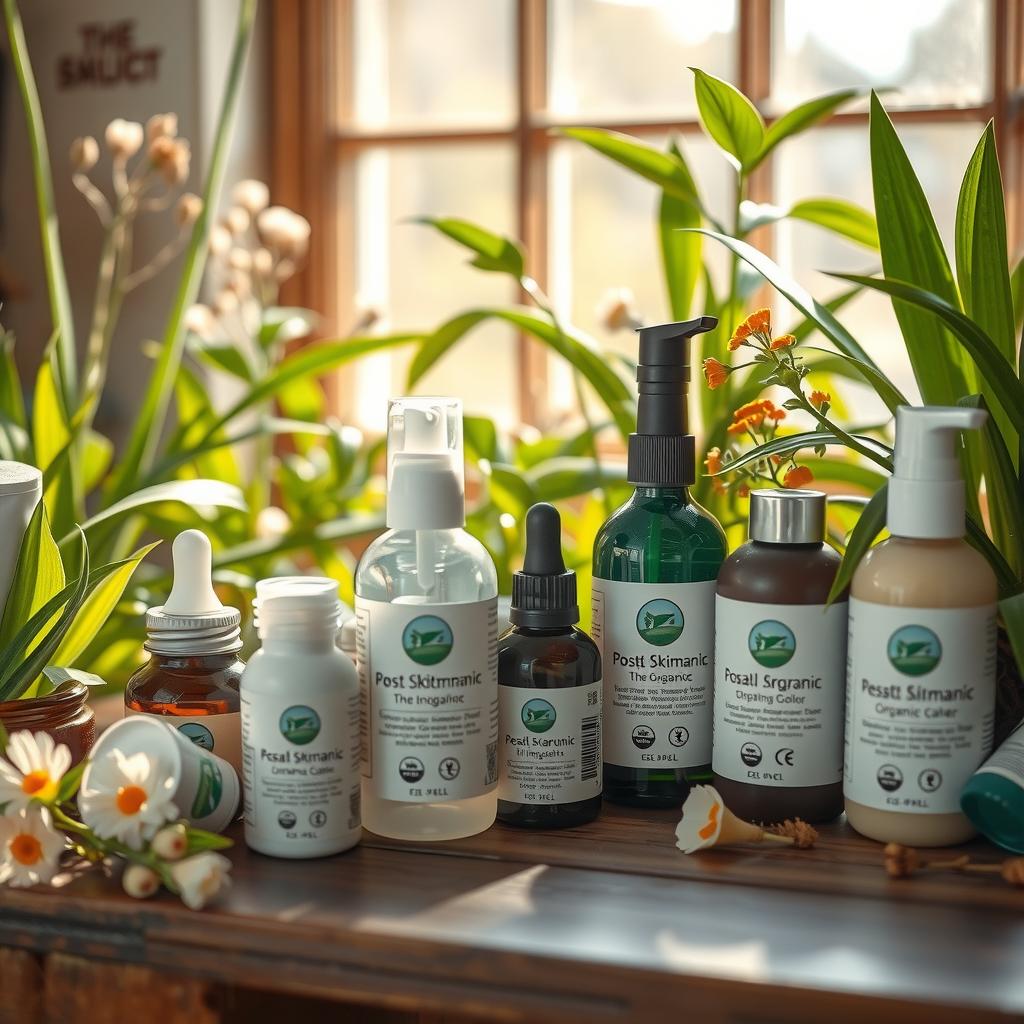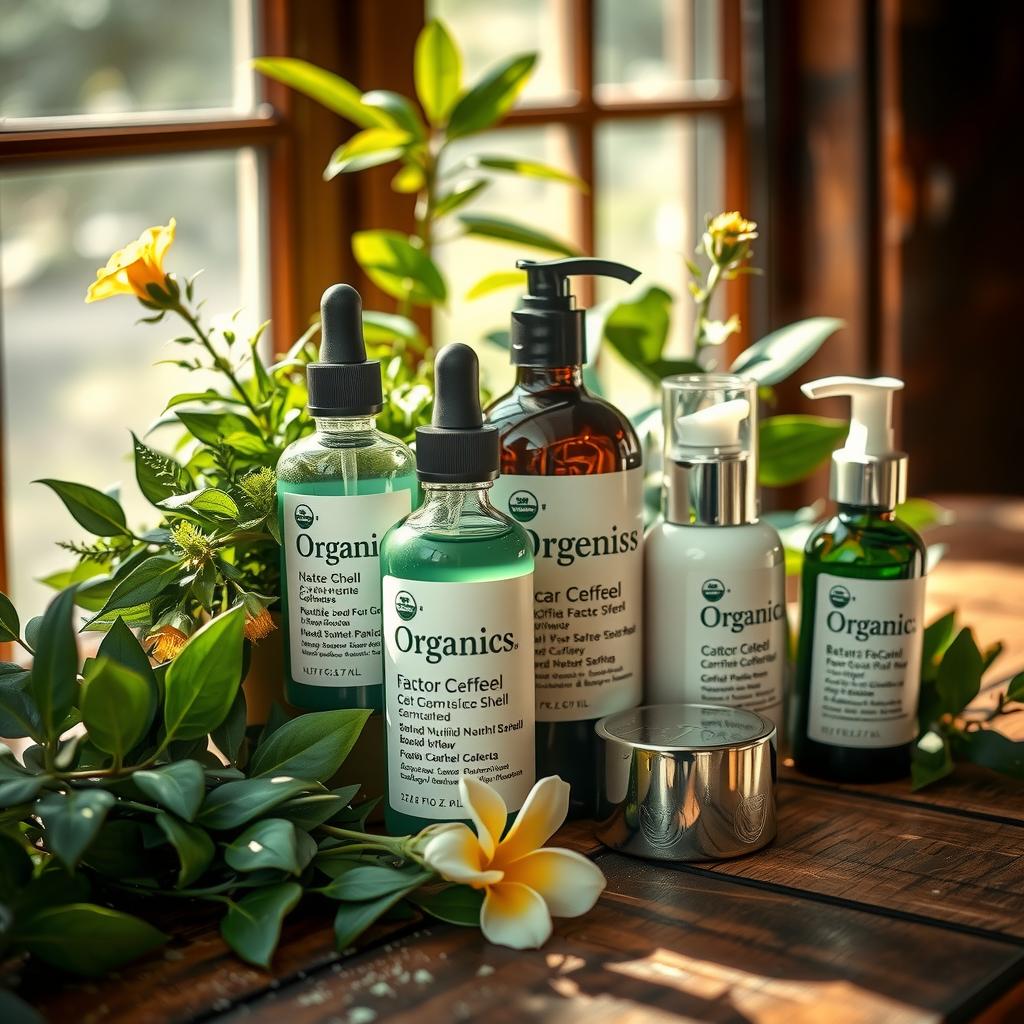Understanding Organic Skincare Certifications
As the demand for organic and natural skincare products continues to rise, navigating the complex world of organic skincare certifications can be a daunting task. With a myriad of labels and claims, it can be challenging for consumers to discern which organic skincare products truly meet the stringent standards required for certification. This article aims to provide a comprehensive overview of the most recognized organic skincare certifications, empowering readers to make informed decisions when selecting their organic skincare products.
One of the most widely recognized organic skincare certifications is the USDA Organic seal. This certification, administered by the United States Department of Agriculture, ensures that the organic skincare products bearing this label are made with at least 95% certified organic ingredients. To achieve this certification, manufacturers must adhere to strict guidelines, including the prohibition of synthetic additives, petrochemicals, and other potentially harmful ingredients. The USDA Organic certification is a testament to the commitment of these skincare brands to providing their customers with truly natural and sustainable skincare options.
Another prominent organic skincare certification is COSMOS, which is recognized throughout Europe. This certification is overseen by a consortium of European organic certification bodies and sets rigorous standards for the use of organic and natural ingredients in skincare products. COSMOS-certified organic skincare products must contain a minimum of 95% organic ingredients, with the remaining 5% being natural or nature-derived. This certification ensures that the organic skincare products not only meet high-quality standards but also prioritize environmental sustainability and social responsibility.
Ecocert is another widely respected organic skincare certification that originated in France. This certification requires that organic skincare products contain a minimum of 95% natural ingredients, of which at least 10% must be organic. Ecocert-certified products are also subject to strict regulations regarding the use of synthetic additives, ensuring that they are free from potentially harmful chemicals. This certification serves as a reliable indicator of a brand's commitment to providing their customers with genuinely natural and eco-friendly skincare solutions.
As consumers become increasingly conscious of the impact their purchasing decisions have on the environment and their personal health, the demand for organic, natural, and sustainable skincare products continues to grow. By understanding the various organic skincare certifications and their requirements, individuals can make informed choices when selecting the best organic skincare products for their unique needs, ultimately contributing to a more sustainable and eco-friendly future.

Key Points:
-
Overview of Organic Skincare Certifications: The skincare industry offers various organic certifications, such as USDA Organic, COSMOS, and Ecocert, which help consumers identify truly organic products and ensure that the ingredients and manufacturing processes meet strict environmental and ethical standards.
-
Understanding USDA Organic Certification: The USDA Organic certification is a well-recognized standard in the United States, requiring that at least 95% of the ingredients in a product be organically produced, and that the product is free from synthetic additives and genetically modified organisms (GMOs).
-
Exploring the COSMOS Organic Certification: The COSMOS certification is a European standard that encompasses not only organic ingredients but also ethical and sustainable practices in the manufacturing and packaging of organic skincare products.
-
Examining the Ecocert Organic Certification: Ecocert is another reputable organic certification body, particularly prevalent in Europe, that ensures the use of natural and organic ingredients, as well as environmentally-friendly production methods and sustainable sourcing.
-
Identifying Truly Organic Skincare Products: Consumers can look for these certifications on the labels of organic skincare products to ensure they are purchasing truly natural and sustainable products that align with their values and preferences.

'Navigating the Organic Skincare Landscape'
Understanding Organic Skincare Certifications
Navigating the world of organic skincare can be a daunting task, with a myriad of certifications and labels to decipher. However, understanding the significance of these certifications is crucial in ensuring that the products you choose align with your values and provide the benefits you seek.
One of the most recognized organic certifications is the USDA Organic seal, which is regulated by the United States Department of Agriculture. This certification ensures that at least 95% of the ingredients in a product are organically grown, free from synthetic fertilizers, pesticides, and other prohibited substances. Similarly, the COSMOS certification, developed by a collaboration of European organic and natural cosmetic associations, upholds stringent standards for organic and natural cosmetic products.
Another reputable certification is Ecocert, a French-based organization that evaluates the natural and organic content of personal care products. Ecocert-certified products must contain a minimum of 95% natural ingredients and 10% of the total ingredients must be from organic farming. These certifications provide consumers with a reliable assurance that the products they purchase are truly organic and adhere to strict environmental and ethical standards.
Navigating the Organic Skincare Market
The organic skincare market has experienced exponential growth in recent years, as consumers become increasingly conscious of the impact of their purchasing decisions on their health and the environment. This surge in demand has led to a proliferation of organic skincare brands, each claiming to offer superior quality and efficacy.
When navigating this market, it is essential to look beyond the marketing claims and examine the product's ingredient list and certifications. Authentic organic skincare products should prioritize natural and sustainable ingredients, such as plant-based oils, botanical extracts, and mineral-based compounds. Avoid products that contain synthetic fragrances, parabens, sulfates, and other potentially harmful additives.
Furthermore, consider the brand's commitment to sustainable and ethical practices. Look for companies that use renewable and recyclable packaging, engage in ethical sourcing, and support fair trade practices. By making informed choices, consumers can support brands that align with their values and contribute to a more sustainable future.
The Benefits of Organic Skincare
Choosing organic skincare products can offer a range of benefits, both for the individual and the environment. Organic ingredients are often gentler on the skin, as they are free from harsh chemicals and synthetic compounds that can cause irritation or disruption to the skin's natural balance.
Moreover, organic skincare is inherently more sustainable, as the production and sourcing of organic ingredients often involve environmentally-friendly practices, such as reduced water usage, minimal chemical waste, and preservation of biodiversity. By supporting organic skincare brands, consumers can contribute to a more sustainable and eco-friendly industry, reducing their carbon footprint and promoting a healthier planet.
In addition to the environmental benefits, organic skincare can also provide tangible improvements to the skin's health and appearance. Many organic ingredients are rich in antioxidants, vitamins, and essential fatty acids, which can nourish and rejuvenate the skin, promoting a radiant and youthful complexion.
As the demand for organic and sustainable skincare continues to grow, consumers are empowered to make informed choices that align with their personal values and contribute to a more conscious and responsible beauty industry.

Decoding USDA Organic Certification
Unlocking the Prestige of Organic Approval
The USDA Organic certification is a prestigious seal of approval that signifies a product has met the rigorous standards set forth by the United States Department of Agriculture (USDA). For organic skincare products, this certification serves as a testament to the dedication and commitment of manufacturers to providing consumers with high-quality, sustainable, and environmentally-friendly options.
The USDA Organic certification process is a comprehensive and thorough examination of a product's ingredients, manufacturing processes, and overall adherence to organic principles. To earn this coveted seal, organic skincare products must contain a minimum of 95% certified organic ingredients, with the remaining 5% consisting of approved non-organic substances. This ensures that the formulation is free from synthetic pesticides, fertilizers, and other potentially harmful chemicals, prioritizing the use of natural and sustainably-sourced ingredients.
In addition to the strict ingredient requirements, the USDA Organic certification also scrutinizes the manufacturing process. Organic skincare brands must demonstrate complete traceability of their supply chain, from the cultivation of raw materials to the final product packaging. This level of transparency and accountability helps to safeguard the integrity of the organic claim and provides consumers with the assurance that the organic skincare products they purchase are truly authentic.
Beyond the USDA Organic certification, there are other internationally recognized organic certifications, such as COSMOS and Ecocert, that hold organic skincare products to similarly high standards. These certifications further validate the commitment of brands to sustainable and eco-friendly practices, ensuring that the production and sourcing of ingredients are in line with the principles of organic and natural skincare.
The pursuit of organic certification is not a simple task, as it requires extensive documentation, rigorous testing, and ongoing compliance. However, for brands that successfully navigate this process, the rewards can be significant. Consumers increasingly seek out organic skincare products, driven by a growing awareness of the potential health and environmental benefits. The USDA Organic certification, along with other reputable organic seals, provides a trusted and reliable way for shoppers to identify products that align with their values and preferences.
By understanding the stringent requirements behind the USDA Organic certification, consumers can make informed choices when selecting organic skincare products. This level of transparency and accountability not only benefits the individual consumer but also contributes to a larger movement towards more sustainable and eco-conscious beauty and personal care industries.
Unraveling the COSMOS Standard
Exploring the comprehensive organic and natural cosmetics certification established by leading European organizations
The COSMOS standard, developed by a consortium of leading European organizations, has emerged as a comprehensive certification for organic and natural cosmetic products. This rigorous standard aims to ensure transparency, sustainability, and environmental responsibility across the entire cosmetics supply chain. By adhering to the COSMOS requirements, cosmetic brands can demonstrate their commitment to using high-quality, organic, and natural ingredients while prioritizing ethical and sustainable practices.
The COSMOS standard was established in 2010 through the collaboration of Ecocert, Cosmébio, BDIH, ICEA, and Soil Association, all of which are prominent organizations in the organic and natural cosmetics industry. The standard's primary objective is to provide a unified set of guidelines that govern the production, labeling, and marketing of organic and natural cosmetic products. This standardization ensures that consumers can trust the authenticity and integrity of the products they purchase, enabling them to make informed choices aligned with their values.
One of the key aspects of the COSMOS standard is its focus on the use of organic and natural ingredients. Cosmetic products bearing the COSMOS certification must contain a minimum percentage of organic ingredients, with the specific requirements varying based on the product category. For instance, leave-on products must contain at least 20% organic ingredients, while rinse-off products require a minimum of 10% organic ingredients. Additionally, the standard prohibits the use of certain synthetic ingredients, such as parabens, phthalates, and synthetic fragrances, ensuring that COSMOS-certified products are free from potentially harmful chemicals.
Beyond the ingredient requirements, the COSMOS standard also addresses the environmental impact of cosmetic production and packaging. It encourages the use of renewable, biodegradable, and recycled materials in product packaging, as well as the implementation of sustainable manufacturing practices. This holistic approach helps to minimize the carbon footprint and environmental burden associated with the production and consumption of COSMOS-certified organic skincare products.
The rigorous certification process for COSMOS-compliant products involves thorough auditing and inspections conducted by independent certification bodies. These audits assess the entire supply chain, from raw material sourcing to final product manufacturing and distribution. This ensures that every step of the process adheres to the COSMOS standards, providing consumers with a high level of confidence in the authenticity and sustainability of the products they purchase.
Organic skincare brands that have achieved COSMOS certification can leverage this recognition to differentiate their products in the market and appeal to conscientious consumers. The COSMOS seal serves as a trusted symbol of quality, transparency, and environmental responsibility, empowering consumers to make informed choices that align with their personal values and preferences.
As the demand for organic, natural, and sustainable cosmetic products continues to grow, the COSMOS standard remains a key player in shaping the industry's landscape. By upholding the highest standards of quality, ethics, and sustainability, the COSMOS certification offers a comprehensive framework for brands to demonstrate their commitment to responsible and environmentally-conscious cosmetic formulations.
Demystifying Ecocert Certification
The Significance of the French-Based Organic Certification
The world of sustainable skincare is rapidly evolving, with a growing emphasis on transparency and ethical practices. One certification that has gained significant attention in this landscape is Ecocert, a French-based organization that has been at the forefront of defining and upholding the standards for organic and natural cosmetics. In this article, we will delve into the significance of the Ecocert certification and its impact on the global skincare industry.
Ecocert was founded in 1991 with the goal of promoting and certifying organic and natural agricultural products, including skincare and cosmetics. The organization has since expanded its reach globally, becoming a recognized authority in the certification of eco-friendly and sustainable practices. Ecocert's certification process is rigorous, ensuring that products meet stringent requirements for organic and natural ingredients, as well as ethical and environmentally-friendly manufacturing processes.
One of the key aspects of the Ecocert certification is its emphasis on the use of natural and organic ingredients. Ecocert-certified products must contain a minimum of 95% natural ingredients, with a focus on plant-based, sustainable, and renewable sources. This helps to ensure that the products are free from synthetic additives, petrochemicals, and other potentially harmful substances, making them a safer and more environmentally-conscious choice for consumers.
Moreover, Ecocert's certification also considers the entire lifecycle of the product, from sourcing and manufacturing to packaging and distribution. This holistic approach ensures that the product's environmental impact is minimized at every stage, promoting sustainability and responsible practices throughout the supply chain.
The impact of the Ecocert certification on the skincare industry has been significant. As consumers become more aware of the importance of using eco-friendly and sustainable products, the demand for Ecocert-certified skincare has steadily increased. This, in turn, has encouraged brands to adopt more sustainable and ethical practices, leading to a proliferation of natural and organic skincare products that cater to the growing conscious consumer base.
Furthermore, the Ecocert certification has become a trusted seal of approval, helping consumers navigate the often-overwhelming world of skincare labels and claims. By providing a clear and comprehensive standard, Ecocert has empowered consumers to make informed choices and support brands that prioritize environmental and social responsibility.
The Rigorous Ecocert Certification Process
The Ecocert certification process is designed to be comprehensive and rigorous, ensuring that products meet the organization's high standards for organic and natural ingredients, as well as sustainable and ethical practices.
The process begins with a detailed review of the product's formulation, where Ecocert experts examine the list of ingredients to ensure that they meet the required percentage of natural and organic components. This includes verifying the source and purity of each ingredient, as well as their compliance with Ecocert's strict guidelines.
In addition to the formulation review, Ecocert also conducts on-site audits of the manufacturing facilities to assess the production processes, waste management, and overall environmental impact. This includes evaluating the use of renewable energy, water conservation, and waste reduction measures, among other factors.
The certification process also considers the product's packaging, with Ecocert encouraging the use of recycled, recyclable, or biodegradable materials. This helps to minimize the product's overall environmental footprint and support the principles of a circular economy.
Once a product has successfully navigated the Ecocert certification process, it is awarded the Ecocert seal of approval. This certification serves as a trusted assurance to consumers that the product has met the stringent standards set by the organization, giving them the confidence to make informed choices in their pursuit of sustainable and eco-friendly skincare.
The Global Reach and Influence of Ecocert Certification
Ecocert's influence extends far beyond its French origins, as the organization has established a global presence and recognition in the skincare industry. With operations in over 130 countries, Ecocert has become a leading certification body for organic and natural cosmetics, setting the standard for sustainable practices worldwide.
The global reach of Ecocert has allowed the organization to shape and harmonize the standards for organic and natural skincare across different regions, ensuring a consistent level of quality and transparency for consumers. This harmonization has been particularly important in an industry where labeling and claims can often be confusing or misleading.
Ecocert's international presence has also enabled the organization to work closely with local authorities and regulatory bodies to develop and enforce regulations for organic and natural cosmetics
Unlocking the Secrets of Organic Skincare: Understanding Certifications
In the diverse world of skincare, navigating the maze of certification labels can be a daunting task for consumers. However, understanding these certifications is essential in identifying truly organic and sustainable products. This article will provide an overview of the most prominent organic certifications in the skincare industry, such as USDA Organic, COSMOS, and Ecocert, and explain what they mean for the conscious consumer.
USDA Organic Certification: The Gold Standard for Organic Skincare
The USDA Organic certification is widely recognized as the gold standard for organic products, including skincare. To earn this certification, a product must contain at least 95% certified organic ingredients, with the remaining 5% consisting of approved non-organic substances. This rigorous standard ensures that organic skincare products are free from synthetic chemicals, pesticides, and other potentially harmful additives.
COSMOS Certification: The European Approach to Organic Skincare
COSMOS is a comprehensive organic and natural cosmetics standard developed by five of Europe's leading organic certification bodies. This certification requires a minimum of 95% natural ingredients, of which at least 20% must be organically produced. COSMOS-certified products also adhere to strict guidelines regarding manufacturing processes, packaging, and sustainability.
Ecocert: Championing Organic and Natural Skincare
Ecocert is another widely recognized organic certification in the skincare industry. To earn the Ecocert seal, a product must contain at least 95% natural ingredients, of which at least 10% must be organically produced. Ecocert also has rigorous standards for the sourcing and processing of ingredients, ensuring that products are both environmentally friendly and ethically produced.
Identifying Truly Organic Skincare Products
To identify truly organic skincare products, consumers should look for the USDA Organic, COSMOS, or Ecocert certification seals on the product packaging. These certifications provide a reliable assurance that the product contains a high percentage of organic and natural ingredients, and adheres to strict production and sustainability standards.
Navigating the Organic Skincare Landscape
The world of organic skincare can be complex, but understanding the various certification standards can help consumers make informed decisions. By choosing certified organic products, individuals can support sustainable and eco-friendly practices while nourishing their skin with natural, high-quality ingredients.
FAQ:
Q: What is the difference between USDA Organic, COSMOS, and Ecocert certifications?
A: The main differences lie in the specific requirements and standards for each certification. USDA Organic is the gold standard for organic products in the US, requiring at least 95% certified organic ingredients. COSMOS is a European standard that mandates a minimum of 95% natural ingredients, with at least 20% being organically produced. Ecocert, another European certification, requires a minimum of 95% natural ingredients, with at least 10% being organically produced.
Q: How can I identify truly organic skincare products?
A: To identify truly organic skincare products, look for the USDA Organic, COSMOS, or Ecocert certification seals on the product packaging. These certifications provide a reliable assurance that the product contains a high percentage of organic and natural ingredients, and adheres to strict production and sustainability standards.
Q: What are the benefits of using certified organic skincare products?
A: Certified organic skincare products are free from synthetic chemicals, pesticides, and other potentially harmful additives. They are also typically more environmentally friendly and sustainable, as they are produced using natural and organic ingredients. By choosing certified organic products, consumers can nourish their skin with high-quality, natural ingredients while supporting eco-friendly practices.
Q: How do organic certifications help consumers make informed decisions?
A: Organic certifications provide a clear and reliable way for consumers to identify products that meet specific standards for organic and natural ingredients, as well as sustainable production methods. By understanding the different certification standards, consumers can make informed choices about the skincare products they purchase, ensuring that they are supporting eco-friendly and ethically-produced brands.
Q: Are there any downsides to using certified organic skincare products?
A: The main potential downside to using certified organic skincare products is that they may be more expensive than non-certified products. However, the higher cost is often justified by the use of high-quality, organic ingredients and the strict production standards required for certification. Additionally, many consumers find that the benefits of using

